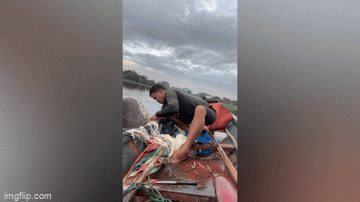Video: Fishermen caught a giant fish weighing 150kg on the Mekong River
Video captures the incredible moment a fisherman caught a giant catfish.
According to Newsflare, fisherman Siannert Mongsing threw a net from his boat into the water in the hope of catching food for lunch on the Mekong River, Udon Thani province, Northern Thailand, on November 9.
However, when he pulled the net back to his boat, he caught a giant animal. The Mekong giant catfish . He estimated it weighed about 150kg.
Siannert Mongsing said: 'I thought a big ball of rubbish was caught in my net, that's why it was heavy but it turned out to be a giant catfish' .

Fishermen are pulling giant catfish onto the boat.
The proud fisherman had to release the giant catfish back into the river because it was too big. They are also a protected species.
Siannert Mongsing added: 'Because they were so big, the meat was almost leathery and not tasty so I was happy to let it swim back to the surface.'
The giant catfish (scientific name: Pangasianodon gigas) is a freshwater fish that lives in the lower Mekong River. With a length of up to 3 meters and a weight of up to 300 kg, the giant catfish can be considered the largest freshwater fish known in the world.
The giant catfish has a large, flat head, a wide mouth with two long barbels on the upper jaw, a long pelvic fin reaching the caudal fin, and a small dorsal fin in front. The back of the fish is dark brown, the belly and fins are lighter. Despite its size, the giant catfish only eats aquatic plants.
In the lower Mekong countries (Laos, Thailand, Cambodia and Vietnam), the giant catfish is hunted so much that its natural population is decreasing significantly, so Laos has banned hunting this fish. Cambodia and Thailand are now planning similar measures.
Pangasius is listed in the Vietnam Red Book and the Red Book of the International Union for Conservation of Nature (IUCN), classified as critically endangered (very high risk of extinction in the wild).
- Catch the rare giant catfish on the Mekong River
- The 150kg strange fish caught on Co Chien River is an extinct fish in Vietnam
- Admire the giant Siamese carp caught in the Mekong River
- Giant coral fishes fishermen
- Finding the giant 'ghost' fish in the Mekong River
- Cambodian fishermen caught a giant stingray in the Mekong River
- Poor fisherman changes his life after catching giant 800kg fish worth more than 600 million VND
- Having just released the moon fish, the fishermen have caught another big son never seen
- Small dams threaten fish species on the Mekong River
- Mekong River fish ranked
- American fishermen caught 95-year-old giant lobsters
- Fishermen caught rare giant grouper weighing 450kg at sea
 Why does steam cause burns worse than boiling water?
Why does steam cause burns worse than boiling water? Lightning-fast octopus is amazing
Lightning-fast octopus is amazing Video: The secret to quickly fold clothes in just 2 seconds for busy people
Video: The secret to quickly fold clothes in just 2 seconds for busy people The eel waving off his head still bites the can of water
The eel waving off his head still bites the can of water